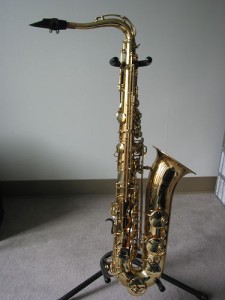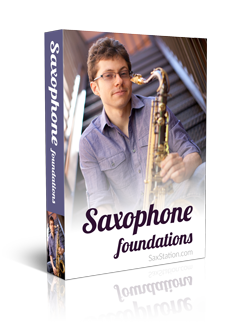Dizzy Gillespie on trumpet with his big band in 1990.
Song is Tin Tin Deo.
Dizzy busts out the cowbell during Paquito D’Rivera’s alto sax solo.
By Neal 4 Comments
Dizzy Gillespie on trumpet with his big band in 1990.
Song is Tin Tin Deo.
Dizzy busts out the cowbell during Paquito D’Rivera’s alto sax solo.
You’ll probably need to apply saxophone cork grease for new saxophones and/or new cork on your saxophone neck. You put it onto the cork of the neck and rub it into the cork.

Different mouthpieces have different diameters as well, so if a new saxophone mouthpiece is tight, you may want to apply some cork grease.
If the cork is compressed, a wider mouthpiece may not stay fixed at the right point on the cork.
To fix that, you can apply heat to the cork, but be careful, you don’t want to damage the cork!
Image from Fred Jala on Flickr.
Tyler, who has been playing saxophone three years wrote to me asking about what he’s working on:
Mostly playing out of tune. Especially in band class if we have a section that is forte and louder it is harder to maintain good tone and pitch. So do you have any tips on how to keep pitch and tone easier?
Hey Tyler,
Probably the best thing to help with that is to practice long tones every day. And use a tuner for part of the time. It’s like an exercise you would do at the gym, you’ll get stronger.
It’s also easy to lower your pitch than raise it. So you might want to keep the mouthpiece a little further onto the cork.
-Neal
Randy Hunter sent me a copy of his book Level Three Jazz Etudes for Saxophone
and here’s my take on it.
Bill Evans playing jazz piano – ‘How Deep is the Ocean’ by Irving Berlin
Bill Evans on piano
Chuck Israels on bass
Larry Bunker on drums.
Played and recorded – London, 19 March 1965 for theUK TV series Jazz 625.
If you were to pass John Butler in the street, with his dread locks, unkempt facial hair and long nails, you could be forgiven for thinking he was just another hippie. What’s more- you would right. If you were to find out he was one of Australia’s best selling artists you could easily think that this particular hippie just got lucky. However, you would be very much wrong.
Branded as the ‘million dollar hippie’ because of his financial success, the real story is how he has kept to his values of peace and unity. Born in April 1975 in California USA and migrating to Australia in 1986, his love for music started at a young age spurred on by his grandfather who taught Butler sounds, morals, and the guitar. As soon as Butler could, he began buskin’ on the streets of Fremantle in Perth, the Western coast of Australia.
Butler recorded his first album and had 3500 cassette tapes of it made. These eventually sold from his street performances. He was no ordinary busker though; he had a real gift for the guitar.
Starting with Indian inspired bluegrass roots music he favored long solos. His weapon of choice the Maton 12 string with the G-6th String removed. Using a style of playing called ‘hybrid picking’; Butler plays multiple notes at the same time. This creates a sound which simply can’t be replicated by other playing styles.
From that moment on, Butler’s life changed rapidly. He began playing every Tuesday at ‘Mojos’ in Fremantle, building his fan base locally. Hard work and determination eventually got him the recognition he deserved and he went on to record his first studio album in 1998 (John Butler). John Butler was a toned down version of his distinctive style, it was an album that consisted of the lengthy solos he was known for along with some other, not so lengthy solos written with radio play in mind. Radio play is exactly what they got; ‘pickapart’ was picked up by Australian Radio station Triple j and put on high rotation.
As time progressed his nails became acrylic (because with his aggressive style his real nails didn’t last long) and he got more skilled as a performer. Along with the honing of his skill and his flair for producing an exciting spontaneous gig his success became more profound. Over a decade later and Butler is know one of Australia’s most successful exports and is actively involved in helping the environment. His passion for music and affinity for upcoming artists led him to create his own record label, Jarrah Records. Through his record label the ‘JB Seed’ grants program was founded in 2004. The focus of the grant program is to bring “social, cultural and artistic diversity in Australian society” (Donovan Patrick, Co-founder) and has to date spent over $400,000 on launching the careers of Australian youths, notable mentions being Missy Higgins, Paul Kelly and The Waifs.
Butler is currently working on his 5th studio album and remains actively involved with the wilderness society. From a very humble beginning, playing on the streets, to now being the ‘millionaire hippie’ Butler maintains his love for playing live, the only difference is now he does it to sold out crowds in Australia’s premier venues. His hopes to now expand his fan base to America no doubt mean you will be seeing a lot more of ‘Australia’ best kept secret’.
With the success that surrounds him Butler maintains he is an artist, nothing more, nothing less.
“Life and the human condition; Love, justice, the spirit, politics, the land, are my inspirations,” he adds.
Kirk Whalum on soprano saxophone
“Peanuts” (Kirk Whalum’s uncle) on alto saxophone
7 Truths and Tips on “How to Get Gigs” and Fill Up Your Touring Schedule
By Daniel Kohn
It’s the famous old question on every hungry band’s mind – How To Get Gigs?
I can hear your pain from this computer screen – “Everyone else can get gigs left right and center but my band is still struggling to figure out how to get gigs…..”
The truth of the matter is that getting gigs and playing live shows isn’t really that hard, you just need to understand the sensitivities of how the live music system actually works.
Why Clubs and Bars Host Live Music In The First Place
From the club and bar owner’s perspective, they are not there to make you famous and they are certainly not there just to be nice, they are simply part of the live performance equation for one very blunt reason – to sell more alcohol, get people to play their poker machines and buy cigarettes. Nothing more, nothing less.
Creating a stage and giving bands a platform to play their music in a live environment is really just another ploy on their behalf to keep their customers in their room and get them to spend more of their money before they go home.
Sad but true.
As a result, it’s important to realize this notion when trying to figure out how to get gigs and build relationships with local bars and clubs.
Proving your value to any bar or venue booker is a little bit like building a business relationship with someone. Do not ever expect to get the Saturday night headline spot without the venue knowing what sort of crowd you could pull and what value you are really worth. It’s not a very arty musical way to think about it all, but unfortunately this is how bar owners think – they are in it to make more money.
Once you understand and surrender to this concept, knowing how to climb the “how to get gigs” ladder becomes a whole lot easier.
Take Whatever You Can Get In The Beginning
When you realize and understand the above, you are ready to pitch yourself to the local venue booker with an offer that they have never heard of before…
You want to shock and surprise the agent by requesting to take the Monday or Tuesday night headline spot. 99.9% of other bands they come across will always be pushing for the Saturday night headline and wont settle for anything less however when your starting out, the idea is not to play in front of hundreds of people straight away, it’s more about proving your “value” to the bar owner and venue booker and starting that relationship that will hopefully get you to the Saturday night spot in 3 months time.
Additionally, all the bar owners and booking agents talk and once they start to hear that your doing good things in one bar, watch how quickly the other places will start calling you!
Invite your friends and get pumped up to try and help your local bar make more money that Tuesday night than ever before by fulfilling your role in this business relationship between the bar and your band. You need to fill the room with as many friends as you have and focus on putting on a great show that will make the booker stupid for not wanting to invite you back.
Personally Deliver Your Demo To Each Venue Booker
This might seem a little over the top and time consuming but it is absolutely critical.
When there are twenty other bands all trying to play in the same five rooms in your town it’s important to have some personal connection with local venue bookers when figuring out how to get gigs.
From my own experience I used to conduct proper research on each venue and find out who the local agents are. I’d get their names and phone numbers and then request five minuets of their time to go down to the venue and deliver them the bands music myself.
I would give them a quick spiel about the band and that they would be happy to take any openings and would keep a big smile on my face at all times.
Remember that the music industry is all about building relationships and networks, that person you just met might be booking another venue in six months time or they might be running the local radio station the following year.
Taking the time to personally deliver your demos and meet these people, even the venue owners is worth a lot more over time than you think
This approach to meeting venue bookers will almost always eventuate in some sort of gig opportunity – just by being personal and nice. Nine times out of ten you will probably catch them at a time when they are filling up the next months spots and they’ll just flick you a few dates for being there.
Definitely a surefire tip on how to get gigs.
Network Like Crazy!
The music industry is all about networking and meeting people. However if you really want to know how to get gigs and lots of them? Make sure you are always carrying a ton of your CD’s in your backpack wherever you go and make sure that your band is at the front of nearly every single conversation you have with anyone remotely involved in the music world.
This is a very grass roots approach to getting gigs however it does work
The other benefit of networking like crazy is that when you do get gigs, you’ve slowly built up a list of people to bring along to the show and hopefully some of them will know your tunes because you gave them a CD to listen to
Weekly Residencies
Residencies generally seem like a thing of the past but if your trying to figure out how to get gigs and are stuck, then going to your local venue and offering to play for free every Tuesday or Wednesday night is not only a great way to build a relationship with them, but more importantly it’s a great way to rehearse for free!
Again, the idea isn’t to play in front of large amounts of people, it’s a stepping stone to the next level. Do not under estimate the value of playing in front of very few people. It’s a humbling and soul strengthening experience that forces you to really shine in an adverse situation.
Contact Other Bands You Like
Again really simple but is always a great way to get your bands name out there. Booking agents and venues get cd’s and demo’s all the time, but how many do other bands get?
Besides from making the band feel special and important, very few people actually try to contact the bands themselves and ask them if they can support them.
The key is to track down bands that you think your band would fit well with musically and slowly warm them into the idea of giving you a support slot.
Another networking opportunity and a great way to get more gigs
Go To Shows and Meet Other Bands
If you want a career in the music industry as an artist, going out and seeing other bands and artists isn’t really a choice it’s imperative and part of being involved in the business.
When you go to other gigs, introduce yourself to other people and other bands, get to know the people who work behind the bar, go up to the bands that night if you thought they were good and give them your CD and ask to play with them next time.
Again it’s all about networking, networking, networking and getting yourself inside a particular scene.
Make sure you also go and check out some of the bigger more happening bands in your area as well. It’s more than likely that industry folks from labels, radio stations, booking agencies etc will also be standing around checking out the talent.
So there you have it, seven new ideas to consider and contemplate if you are trying to figure out how to get gigs and fill up your touring schedule.
Here the author writes about tips on “How to Get Gigs”. In present time every one wants to be popular. Author describes 7 simple & true steps about getting gigs for you. Read more about Music Record Labels, Music Promotion Marketing.
Jackie Mclean on alto saxophone
Sweet Love of Mine on Demon’s Dance
By Neal 2 Comments
In response to a question from Chris about Buying a Saxophone, here are some other ideas on the the subject from Manny:
Well, let me put in my 2 cents, or at least where I’m at, “2 yen” worth.
Definitely, bring another (and more experienced) sax player with you. Like buying a new car, take the time and try out different saxes. When I started taking sax lessons after a long absence, due to my work schedule, I used the music school horns, a Yamaha 275. That is also a great horn. I’ve had nothing but great experiences with Yamahas. Later, I brought my high school/college YAS-23 from home and practiced with it before buying my new Selmer alto Ref 54. Both are great horns.
Since you have had one lesson, I would say rent first (or if you can, use the school horn, like me). That way, you will know if you really like the sax. And during the time you are learning, go to different music stores and try their horns. People buy certain saxes for many reasons (ie. sound, quality, weight, the feel of the fingers on the keys, looks, etc.). I took a year before I settled on my horn.
Go to different websites, like www. saxontheweb.net. There are a lot of people who can give you good advice.
You were going to spend $1500 on a beginning horn. I think way too much! I would say save the money and for a few hundred more, you can get a professional horn without much trouble if you’re into sax for the long haul. You can even bargain music stores down a few hundred dollars if you can shell out the cash on the day, like me. Check the internet. There are many sax store around the World you can check. Check out You Tube for sax demos. If your going to spend a few hundred dollars more, I would recommend the Yamahas, Yanigasawas, and the P.Mauriats. I played a few P.Mauriats and they are great horns for the money. The reason they are inexpensive is that they are made in Taiwan, but from brass from France. They have gotten great reviews.
The best of luck to you.
Manny
Kirk Whalum on Tenor Saxophone
Latin jazz guitarist Mark Towns
Cuban Pianist Rianel Pino
“Spanish Funk” (from the CD “Passion” by Mark Towns)
At the Arena Theatre in Houston Texas


Want to play saxophone, but feeling lost and not sure how to get started?
In this online/downloadable class you will see methodical lessons in a sequence and you can get feedback and ask questions at any point.
Learn more
Want to take your playing to the next level?
You’ll learn fundamental saxophone skills, building past the basics. Master rhythms. Learn about phrasing, tone, and more. Here you will get feedback which is crucial to developing good habits.
Learn more